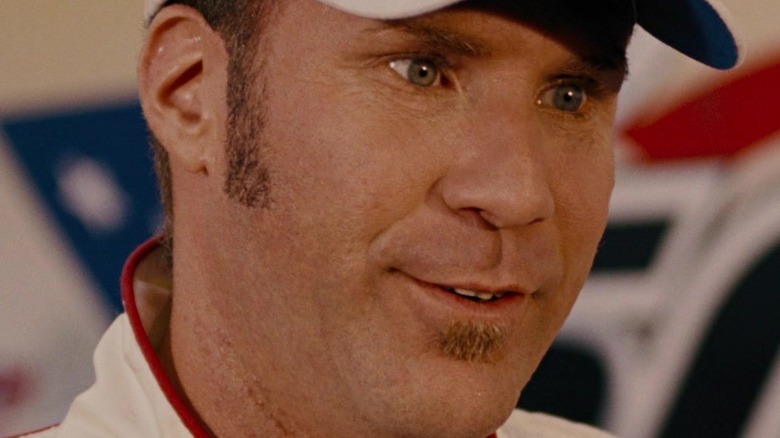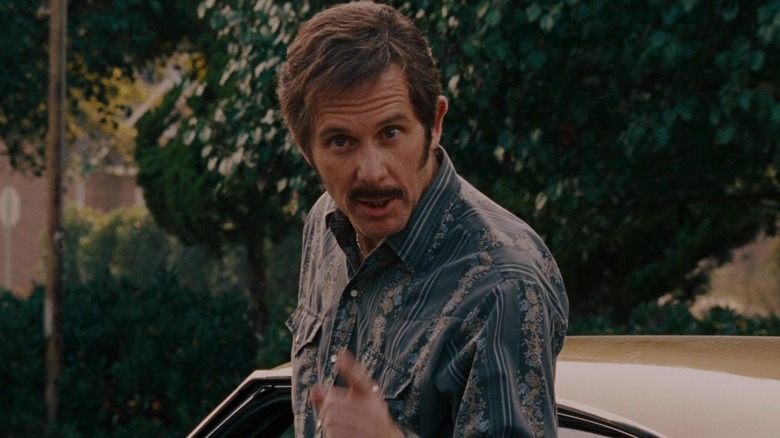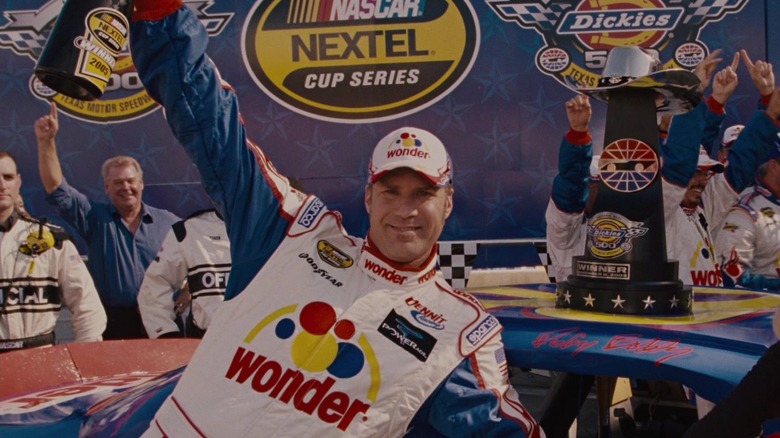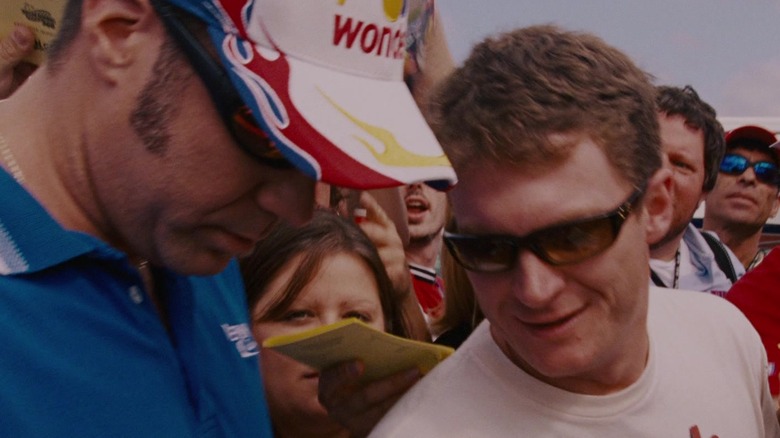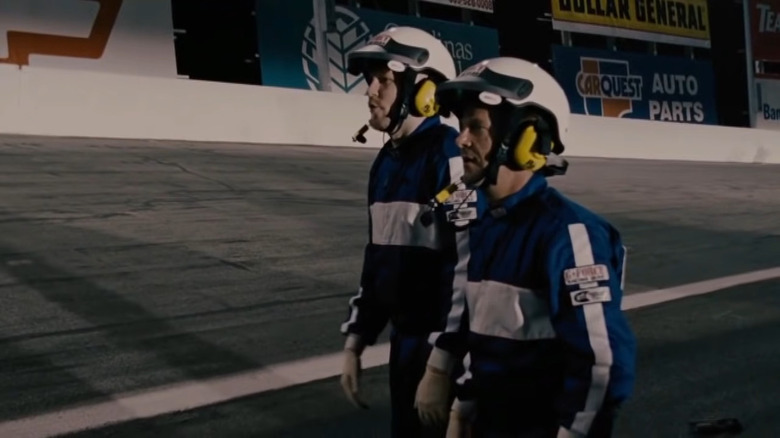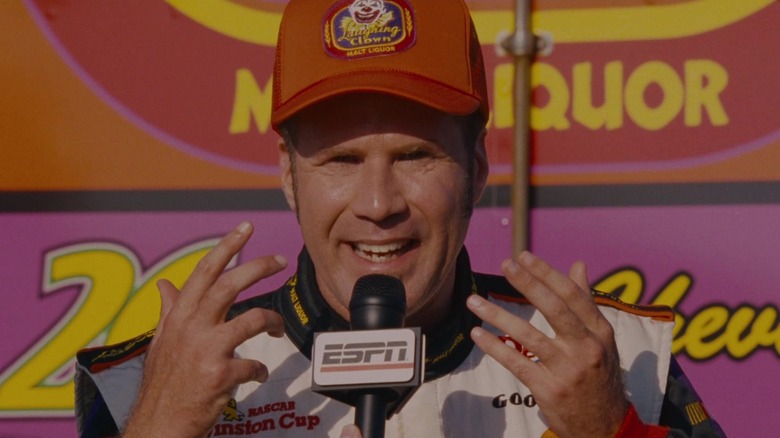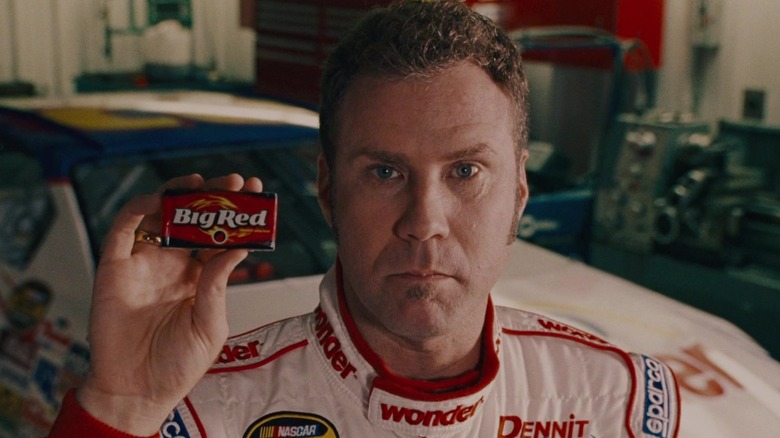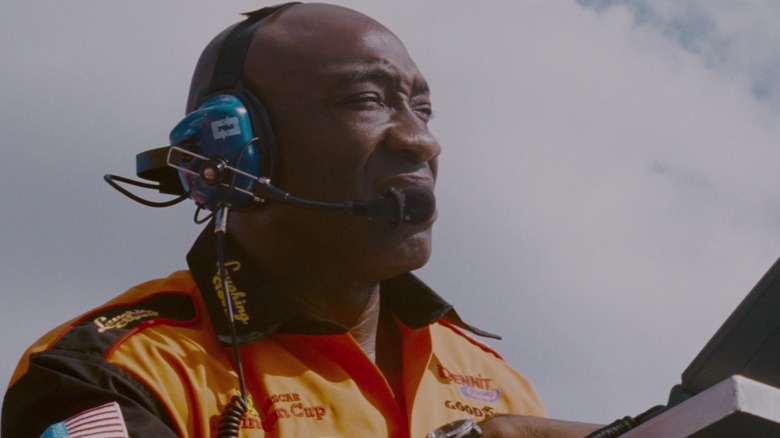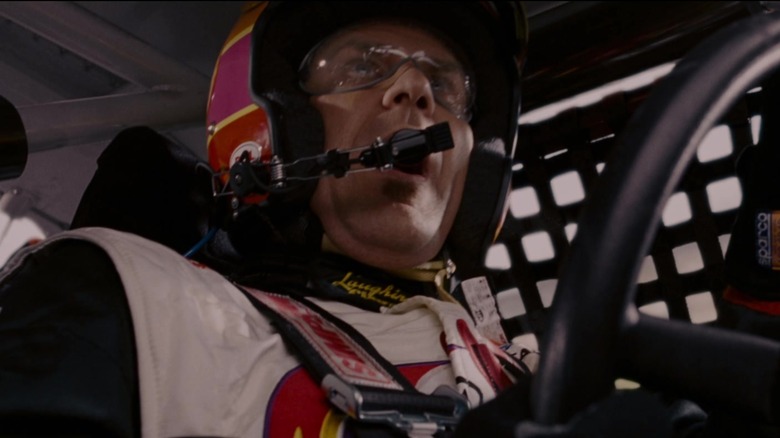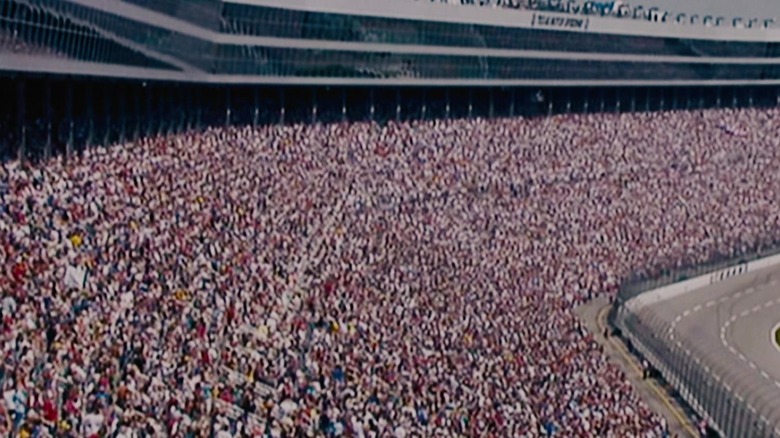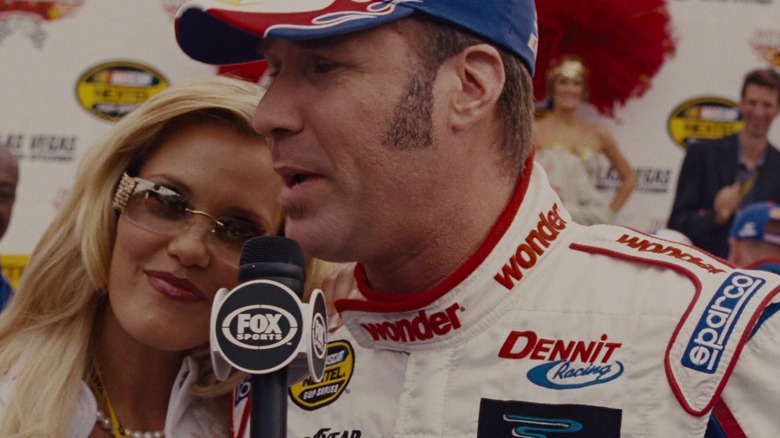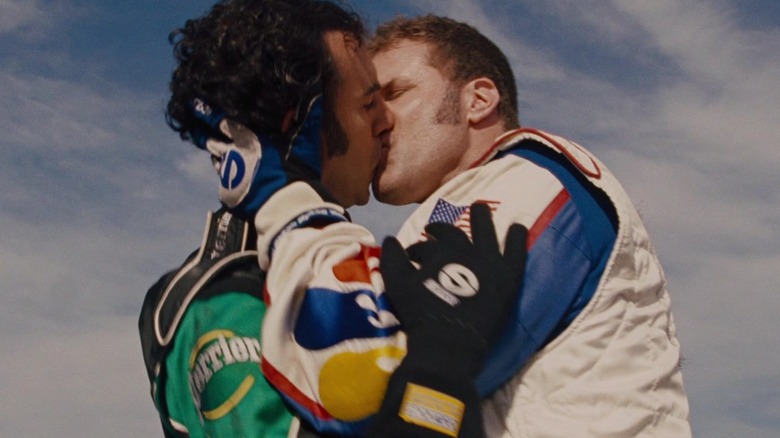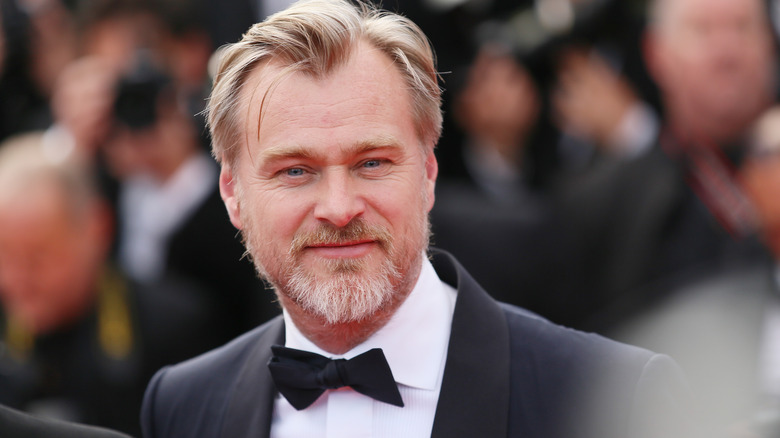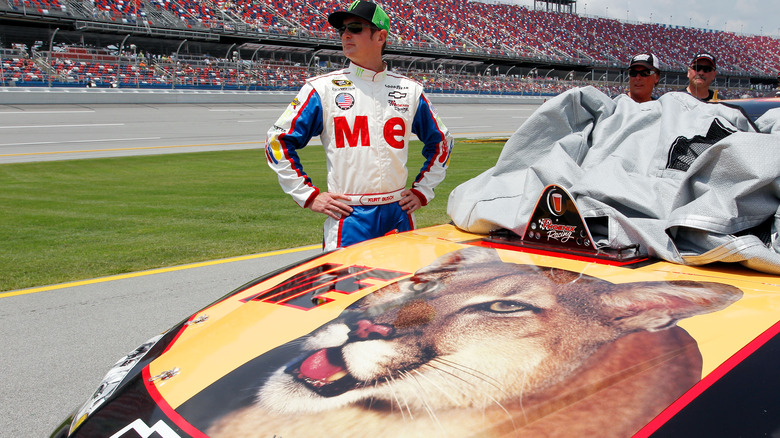The Untold Truth Of Talladega Nights
We can't get enough of "Talladega Nights: The Ballad of Ricky Bobby." It's not only one of Will Ferrell's funniest films and one of the best racing movies of all time, it also packs in a surprising amount of intelligence and heart. Along with "Anchorman," it may represent the peak of the much-missed collaboration between Adam McKay and Will Ferrell. Ferrell was sticking with comedy, McKay was getting ready to veer off to more personal and openly political projects, and "Talladega Nights" hit the perfect sweet spot to satisfy them both.
With an all-star cast that includes not only Ferrell but John C. Reilly, Sacha Baron Cohen, Michael Clarke Duncan, Leslie Bibb, Gary Cole, Jane Lynch, and Amy Adams, "Talladega Nights" is packed full of charisma and comedic brilliance. Plus, if we started quoting the lines from it that have taken up permanent residence in our brain, we'd be here all day.
If "Talladega Nights" is "The Ballad of Ricky Bobby," it's time for us to explore the unsung ballad of "Talladega Nights." Let's follow one of our favorite comedies from its filming to its legacy.
Fathers and sons
Father issues may haunt Ricky Bobby, but Will Ferrell and his father thankfully seem to have a happier and much more consistent relationship. Of course, it's easy to miss Lee Ferrell's presence in "Talladega Nights" ... unless you know where to look or, more accurately, where to listen. Lee Ferrell is a musician, not an actor. He plays both piano and saxophone and spent years performing with the Righteous Brothers.
His song "Goodbye Cowboy" appears on the "Talladega Nights" soundtrack, and as Will Ferrell stressed to the Press-Telegram, it got there on its own merits. As Ferrell explained, "Having my dad's song in the movie is neat because it's not like I said, 'Hey, put my dad's song in the movie.' It was the director [Adam McKay] and the other creative decision-makers that wanted to include it."
The elder Ferrell also tops Reese Bobby in another major way. Years after the fact, Will Ferrell mentioned that his dad had given him an amazing piece of advice. "He said, 'Will, if it was only about your talent, I wouldn't worry about you. But it's all about luck.' When he said that, it kind of took the pressure off of succeeding ... and demystified it." That's a much healthier outlook than "if you ain't first, you're last."
Wonderstruck Wonder Bread
As "Talladega Nights" fans know, no NASCAR driver loves product placement more than Ricky Bobby, who gives Powerade a shout-out when he's saying grace and risks life and limb by putting a Fig Newtons sticker on his windshield. The movie is full of brand names like Wonder Bread, Perrier, Old Spice, and Applebee's. It had to be — that's just how NASCAR works. As Tom Meyer, the president of a company connecting studios and advertisers, told the Wall Street Journal, "If it didn't have a lot of brands or logos on it, then it wouldn't be considered authentic."
Since Sony needed that product placement for the movie to feel real — and since director Adam McKay had always had certain sponsors, like Wonder Bread, in mind — it gave advertisers an unusual deal. They could have their product placement for free. The deal was also good for the studio since it ensured that there would be no shortage of companies willing to take the deal.
It paid off for a lot of advertisers, but no one won bigger than the then-bankrupt Wonder Bread, Ricky Bobby's own sponsor. Ad Age notes that according to Joyce Julius & Associates, which monitors this kind of promotion, audiences clearly saw the Wonder Bread logo for 11 minutes and 32 seconds during the movie – exposure worth approximately $4.3 million.
NASCAR partnership
It didn't take Sarah Nettinga — the managing director of media and entertainment marketing for NASCAR at the time — long to realize that this was the cast and crew NASCAR had been waiting for. "I think what really stood out to us was that they were going for true and authentic," she said in ESPN's oral history of the movie. NASCAR bent over backwards to make it easy on them.
In the production notes posted at Made in Atlantis, Adam McKay said, "[NASCAR was] completely open and gracious to us from start to finish. We also won over the team owners and drivers. Without them, we could never have secured the access we did." That access included hands-on tutorials in the pit, the ability to film not only on NASCAR speedways but during the races themselves, and tons of face-time with drivers and mechanics. It was a dream come true.
Unbelievably, NASCAR wound up offering them not just material and access but jokes. Driver Andy Hillenburg told the ESPN oral history, "Someone with NASCAR came up with what I thought was a great idea. Fans are always complaining about commercials interrupting action during TV broadcasts, so why not do that in the middle of the crash?" If you're already thinking about that Applebee's commercial and laughing, we're right there with you.
On set in Charlotte
"Talladega Nights" did a lot of shooting in and around Charlotte, North Carolina, and according to ESPN's oral history of the movie, the filmmakers made themselves at home there.
Locals will recognize a lot of sights. The Pit Stop was a former sports bar that underwent a movie makeover, for example, and the gym where Ricky Bobby plays wheelchair basketball was in a church basement. Minister Robin Coira says that people's eyes still light up when they realize where they are. Since the cast and crew liked the space enough to keep using it for their own off-the-clock basketball games, the gym now has a little extra allure. Coira reminisced, "On Sunday mornings we would be in our worship services upstairs, and people had no idea that Anchorman was down here playing basketball with the crew."
Of course, Charlotte people appear right alongside Charlotte places. For example, local actor William Boyer — playing a safety worker who tries in vain to convince Ricky that he's not on fire — remembers the city's Hollywood guests fondly, especially Ferrell. "Nicest guy ever," he said. "He was at the height of his popularity and yet talked to nobodies like they were somebodies."
A leery fanbase
Between the announcement that "Talladega Nights" was in the works and it finally hitting theaters, NASCAR fans had plenty of time to get nervous — and from their point of view, they had plenty to be nervous about. As Today notes, they were still jumpy from 1990's "Days of Thunder," the Tom Cruise blockbuster that's almost universally loathed in NASCAR circles.
According to EW, NASCAR wanted "Days of Thunder" to present a positive, upbeat image, but as the publication explains, "The movie they got — with its scenes of drivers deliberately ramming each other on the track and swilling moonshine off it — left NASCAR in an awkward spot." A fair amount of the film's characterization was drawn from real-life figures, just not the ones NASCAR wanted to promote. The technical details, meanwhile, were out-of-date. Even Harry Hyde, a NASCAR crew chief who cheerfully verified the reality of some parts of the movie — "The moonshine was mine" — admitted to some disappointment with how the movie used dilapidated barns as substitute garages, downplaying the much more contemporary and professional automotive environment. "I guess they wanted to show it like it was instead of how it is," he said.
While fans waited to see how "Talladega Nights" would turn out, they got mixed messages from the sport's star drivers. Dale Earnhardt Jr. supported the film and even made a cameo in it, but Jeff Gordon bowed out because he didn't think it gelled with how his sponsors would like to represent things.
Economic underpinnings
While "Talladega Nights" is laugh-until-you-cry funny, it also comes with some thoughtful subtext about commercialization and capitalism run amok — material that's not surprising when you remember that Adam McKay also directed "The Big Short," an acerbic dramedy about the financial crisis.
It's also not surprising that McKay is thoughtful about it. In an interview with The Washington Post, he mused on how hyper-sponsored the racing world is, saying, "Every single element of the sport had a sponsor. These guys were owned 30 different ways. Contrast that with the aura of individuality that's at the center of the sport." It's become a very different beast from what started out as more of a blue-collar sport, and McKay captures how corrosive the corporate angle can be. It taints the purity and simplicity of the competition.
Of course, competition is also in McKay's sights. "Talladega Nights" doesn't see anything wrong with a good old-fashioned contest, but it understandably sees a lot wrong with Ricky Bobby's "if you ain't first, you're last" mantra. "With Ricky Bobby, when he's winning, it's awesome," McKay wrote. "But the second he has a rough day, everything's gone. And that all or nothing mentality isn't really good." In everything from economy to games to relationships, McKay suggests, we all need to be able to embrace the cooperative approach from time to time.
Adventures in the pit
Against all odds, the pit crew actors in "Talladega Nights" — led by the great Michael Clarke Duncan — got pretty good at their fake job.
Duncan was happy to have the easiest job of the bunch. In production notes from Columbia Pictures (via Made in Atlantis), he noted, "As pit crew chief, all I had to learn was how to tell the other guys what to do. ... Those guys were in a constant sweat for two hours since the tires weigh about 75 pounds. The real NASCAR pit crews are athletes — football and baseball players — recruited especially for their athletic ability." The athletic background of real-life pit crews was probably some consolation to the actors, who struggled to make their pit stops as quick as possible. We certainly wouldn't want to do that kind of heavy lifting.
While the movie pit crew could never realistically equal NASCAR's time — a breathtaking 13-second pit stop — they managed a respectable 22 seconds. Actor Ian Roberts ruefully noted that it wasn't anything to boast about — "In the real NASCAR world, that long of a pit stop would probably cost us the race" — but Will Ferrell took a more optimistic view, noting that their time was still decent for the lower division races. "Now I have something to fall back on if this whole film acting thing goes away," he joked.
We can't be wusses here
NASCAR cars whip around the track at death-defying speeds, and the "Talladega Nights" actors had to steel themselves to get at least a taste of that kind of action ... whether they liked it or not. According to the movie's production notes (per Made in Atlantis), they turned to the Richard Petty Driving Experience, and they started out as passengers — though that wasn't much easier. "The first thing they do is have you ride shotgun with a real NASCAR driver at about 180 miles an hour around the track," Sacha Baron Cohen said. "It was one of the most unpleasant experiences of my life."
When they finally got behind the wheel, it was even more intimidating — so much so that they immediately tried to bail out. The Richard Petty Driving Experience's CMO at the time, Chris McKee, told ESPN, "After one lap they were done. They were hollering to get off the track." The one who talked them into trying again was John C. Reilly, who couldn't stand to walk away. McKee remembers him saying, "'Guys, we can't be wusses here. We can't make a NASCAR movie and not actually experience being in a race car.'" So if you like the realism of the movie's driving scenes, you can give the credit to the Richard Petty Driving Experience — but make sure to reserve some for Reilly.
Real racetrack, real crowds
Director Adam McKay and his cast and crew had all found NASCAR helpful and easy to deal with — but the prospect of a NASCAR race crowd was still intimidating enough that they considered staying away from the speedway when there were races scheduled. According to McKay (per Made in Atlantis), credit for the real racetrack ambiance goes to executive producer David Householter: "He believed that you couldn't beat the production value of filming during an actual live race. There is no substitute for a track crammed with 200,000 screaming fans."
Householter was right. The energy, immediacy, and verisimilitude of shooting on the speedway with the crowds roaring and the cars racing by were invaluable. Made in Atlantis notes that the dialogue from those shoots was completely unusable due to the deafening background noise, but a little post-production sound editing was a small price to pay.
Unfortunately, it turns out the NASCAR fans shared Ricky Bobby's opinion of the French. When Sacha Baron Cohen was introduced to them as Jean Girard, the stadium erupted into seemingly unanimous booing. We wonder if they'd rather get their arms broken than announce that they love crepes.
Sigh of relief
The NASCAR fanbase was on edge before the "Talladega Nights" premiere. Was the movie about to make their beloved sport into a national laughingstock?
As ESPN writer Ryan McGee put it in the "Talladega Nights" oral history, "The sigh of relief that accompanied that '06 debut can still be heard around the racing world." Humpy Wheeler, who was president of the Charlotte Motor Speedway at the time, recounted how tense everyone was, explaining, "The first half-hour of the film no one would laugh because they were watching [NASCAR president Mike Helton] to see if he was laughing." The moment that finally gave them permission to laugh came when Carley Bobby (Leslie Bibb) shouted, "I am a driver's wife! I don't work!" Wheeler said, "That was what you call an ice breaker, a spot-on inside joke. Mike Helton cracked up. Then everyone did."
Will Ferrell was just relieved that nobody was angry. They managed to make an uproariously funny film without selling out the people and organization who'd helped them make it, and they'd proven that NASCAR could laugh at itself. The sport finally had a movie that captured what contemporary fans loved about it — and against all odds, it was the film that featured Will Ferrell running around in a pair of tighty-whities.
Award-winning kiss
"Talladega Nights" isn't the kind of movie that garners a ton of Oscar nominations, but we can point to at least one surprising award win: the MTV Movie Award for Best Kiss. After Ricky Bobby beats Jean Girard — in an on-foot sprint to the finish line — he finally discards his homophobia and kisses Girard to show he accepts him as an equal. We promise that it's the funniest and most heartwarming kiss ever filmed between a straight NASCAR driver and his gay French rival.
The kiss definitely plays as a comedic beat, but thankfully, it doesn't really feel like the punchline is that it's between two men. "Talladega Nights" gets its comedic mileage here out of Ricky's bizarre choice of a conciliatory gesture, not out of Girard's sexuality. (Girard's portrayal actually landed the film a nomination for a GLAAD Media Award.) Back in 2006, director Adam McKay notes in The Washington Post, the kiss was still controversial enough to upset people: "[It] really played [as] shocking in the Deep South. ... I heard stories from the Deep South about people walking out of the movie theater." McKay hopes that there wouldn't be the same reaction today.
McKay is still proud of how the film handles Girard, who's perfectly comfortable in his own skin and perfectly cool in the bargain: debonair, sophisticated, and happily settled down. Who wouldn't want to kiss him?
Talladega Nights' most surprising fan
The informal "Talladega Nights" fan club is delighted to have one extremely unexpected member: legendary director Christopher Nolan.
Nolan is famous for mind-bending films that combine classic genres — science fiction, heist, superhero, war, thriller — with unusual storytelling structures that play with time and reality. His movies are thoughtful, chilly, and dense with ideas. We weren't surprised to learn that Nolan admires directors like Stanley Kubrick, Michael Mann, and Ridley Scott, whose playing fields and styles overlap with his own. "Talladega Nights," on the other hand, is a bit of a wild card. An amused Nolan told USA Today, "It must be the films I make. People are always shocked to find out that I would ever watch a comedy or that I'm a big fan of 'Talladega Nights,' for example."
He's even a big enough fan that it's come up in interviews more than once. In a phone interview for The Rich Eisen Show, Nolan didn't just give "Talladega Nights" a shout-out — he described it as one of his "remote drop" movies, where he has to stop channel-surfing and watch it whenever it comes out. It's the example that came to his mind right after the works of Stanley Kubrick. We have to love a filmmaker with that kind of enthusiastic, wide-ranging taste.
Life imitates art
All the worries about whether or not NASCAR fans — and drivers — would embrace "Talladega Nights" quickly went up in smoke once the movie actually came out. It didn't take much longer to reveal that "The Ballad of Ricky Bobby" was now a part of NASCAR culture for good.
In a 2009 race at Talladega, Carl Edwards walked away from a seemingly catastrophic wreck — leading Larry King to describe him as "Superman" — only to run across the finish line. "I'm kind of a Will Ferrell fan. He did that at the end of ... 'Talladega Nights.' That was awfully close to give up. I had to go and finish the race."
In July 2021, Chip Ganassi's team worked together in the Quaker State 400, with one driver, Ross Chastain, deliberately slowing down the competition with a traffic jam so that his teammate, Kurt Busch, could snag the win. Afterwards, Kurt delighted in the strategy and gave a tip of the hat to "Talladega Nights," saying "shake and bake" in an interview with NBC Sports (qtd. NASCAR). Thankfully, unlike Ricky Bobby, he actually promised then and there to pay his teammate back for his assistance.
Kurt Busch is also responsible for our favorite homage to the movie ... actually, homages, plural. As an independent driver, he opted for Ricky Bobby's end-of-movie "Me" car with its cougar. And later, as Business Insider notes, he doubled-up on the "Talladega Nights"-themed cars by going full Wonder Bread.
